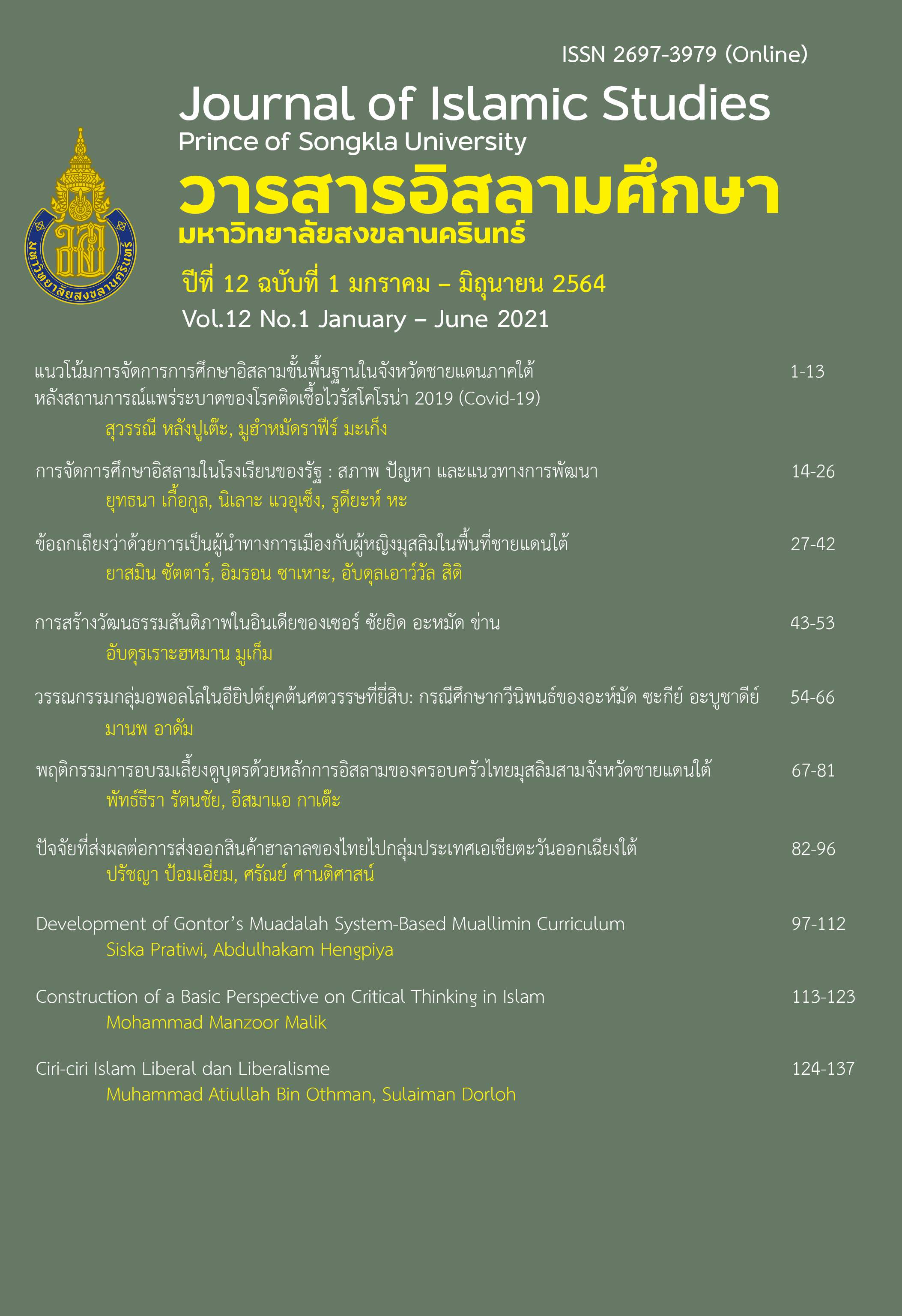Factors Affecting the Export of Halal Products of Thailand to Southeast Asian Countries
Keywords:
Exports, Southeast Asian Countries, HalalAbstract
Objective The objective of this paper is to study factors affecting the value of Thai halal exports to Southeast Asian countries. The factors considered are gross domestic product, population, foreign direct investment, exchange rate, distance, common border, landlock, and member of The Organization of Islamic Cooperation.
Methodology We use annual panel data covering the period from 2009 to 2018 where the analysis is conducted via a Random Effects Model by Generalized Least Squares (GLS).
Research findings Results revealed that the factors positively affect Thai Halal exports are gross domestic product, having a common border with Thailand, and being a landlocked country. Factors that negatively affect Thai Halal exports, on the other hand, are distance between Thailand and the country, and being a member of The Organization of Islamic Cooperation.
Applications Thailand should promote and expand markets for Thai Halal exports to relatively high-income countries, the CLMV countries that share a common border with Thailand and enhance the credibility of Halal products to The Organization of Islamic Cooperation member countries in Southeast Asian.
References
Chakravarty, S. & Chakrabarty, R. (2014). A gravity model approach to Indo-ASEAN trade-fluctuations and swings. Procedia Social and Behavioral Science. 133, 383-391. https://doi.org/10.1016/j.sbspro.2014.04.205
Choi, I. (2001). Unit root test for panel data. Journal of International Money and Finance. 20(2), 249-272. https://doi.org/10.1016/S0261-5606(00)00048-6
Hadri, K. (2000). Testing for stationary in heterogeneuos panel data. Econometric Journal, 3(2), 148-161. https://doi.org/10.1111/1368-423X.00043
Hausman, J. A. (1978). Specification tests in econometrics. Econometrica, 46(6), 1251- 1271. https://doi.org/10.1016/S0304-4076(03)00092-7
Im, K. S. & Pesaran, M. H. & Shin, Y. (2003). Testing for unit roots in heterogeneous panels. Journal of Econometrics, 115(1), 53-74
Ismail, M. & Mawar, M. (2012). Malaysia-OIC Trade: Static and Dynamic Gravity Model Approaches. Journal of Economic Cooperation and Development. 33(2), 75-94.
Johnston, J. & Dinardo, J. (1997). Econometric Methods. (4th ed.). McGraw–Hill.
Kanitphong, T. & Phanthamit, N. & Phrommačhak, S. (2014). Analysis of Trade Flows between Thailand and ASEAN Members Using Gravity Model. NIDA Business Journal, 9(15), 5-20.
Levin, A. & Lin, C. F. & Chu, C. (2002). Unit root tests in panel data: Asymptotic and finite sample properties. Journal of Econometrics. 105, 1-24. https://doi.org/10.1016/S0304-4076(01)00098-7
Maddala, G. S. & Wu, S. (1999). A comparative study of unit root tests with panel data and a new simple test. Oxford Bulletin of Economics and Statistics, 61, 631-52. https://doi.org/10.1111/1468-0084.0610s1631
Majeed, I. & Al-Zyoud, H. & Ahmad, N. (2019). Jurisprudence and demand for halal meat in OIC. British Food Journal, 121(7), 1614-1626. https://doi.org/10.1108/BFJ-08-2018-0562
Studenmund, A.H. (2011). Using Econometrics: A Practical Guide. Pearson Publishers.
The Organisation of Islamic Cooperation. (2021). Member States. https://www.oic-oci.org/states/?lan=en
The World Bank. (2021, April 26). World Development Indicators. Retrieved from https://databank.worldbank.org/reports.aspx?source=2&type=metadata&series=SP.POP.TOTL
The World Bank. (2021, April 26). World Development Indicators. Retrieved from https://databank.worldbank.org/reports.aspx?source=2&type=metadata&series=NY.GDP.MKTP.CD
Tinbergen, J. (1962). Shaping the World Economy: Suggestions for an international Economic Policy. The Twentieth Century Fund.
Torres-Reyna, O. (2007). Panel Data Analysis Fixed and Random Effects Using Stata (v. 4.2) [PDF]. Data and Statistical Services of Priceton University. Retrieved from https://dss.Princeton.edu/training/Panel101.pdf
Downloads
Published
How to Cite
Issue
Section
License
Copyright (c) 2021 Journal of Islamic Studies, Prince of Songkla University

This work is licensed under a Creative Commons Attribution 4.0 International License.
All articles Published in The Journal of Islamic Studies are author’s opinions, and not the responsibility of the Faculty of Islamic Sciences nor the editorial board. However any citation should be referred to the journal.
















